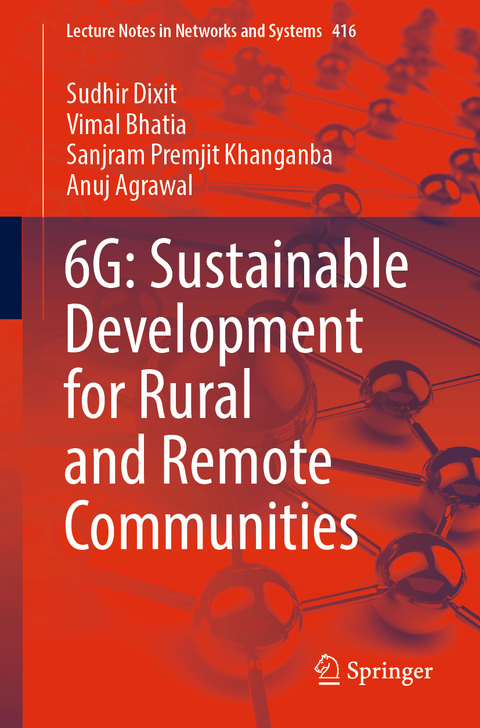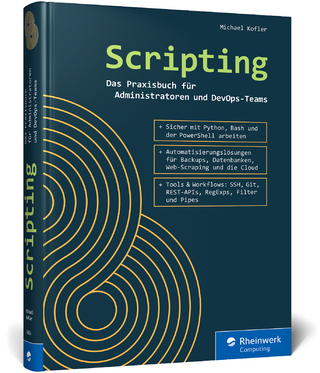
6G: Sustainable Development for Rural and Remote Communities
Springer Verlag, Singapore
978-981-19-0341-0 (ISBN)
Sudhir Dixit is a Co-Founder, Senior Fellow, and Evangelist at the Basic Internet Foundation in Oslo, Norway, and heads its US operations. He is also associated with the Academy of Finland Flagship Programme, 6G Flagship, led by the Centre for Wireless Communications, University of Oulu, Finland. From 2015 to 2017 he was the CEO and Co-Founder of a start-up, Skydoot, Inc. From 2009 to 2015, he was a Distinguished Chief Technologist and CTO of the Communications and Media Services for the Americas Region of Hewlett-Packard Enterprise Services in Palo Alto, CA, and the Director of Hewlett-Packard Labs India in Palo Alto and Bangalore. Before joining HP, he held various leadership positions at BlackBerry, Nokia, NSN, and Verizon Communications. He has been a technical editor of IEEE Communications Magazine and presently chairs the Working Groups 6G Visions and New Directions in Communication at the Wireless World Research Forum (WWRF). He is also the Vice-Chair for Americas at the WWRF. He was on the editorial board of IEEE Spectrum Magazine and sits on the editorial board of Springer’s Wireless Personal Communications Journal. He is a Co-Chair of the Industry Engagement Committee and Co-Chair of the CTU Working Group at the IEEE Future Networks Initiative. In 2018, he was appointed a Distinguished Lecturer by the IEEE Communications Society. From 2010 to 2012, he was an Adjunct Professor of Computer Science at the University of California, Davis, and, since 2010, he has been a Docent at the University of Oulu, Finland. A Life Fellow of the IEEE, IET, and IETE, Dixit holds a Ph.D. from the University Strathclyde, Glasgow, UK, and an M.B.A. from the Florida Institute of Technology, Melbourne, Florida. Vimal Bhatia is a Professor of Electrical Engineering and Centre for Advanced Electronics at the Indian Institute of Technology (IIT) Indore, India. He is also currently an Adjunct Faculty at IIT Delhi and IIIT Delhi. He has a mix of academic and industrial experience both in India and the UK. He completed his Ph.D. from the Institute for Digital Communications at The University of Edinburgh, the UK in 2005. His research interests are in the broader areas of wireless and optical communications, machine and deep learning, and signal processing with applications to telecommunications, and software product development. He is a PI/co-PI/coordinator for external projects with funding of over USD 17 million from MeitY, DST, UKIERI, MoE, AKA-Finland, TFK-Finland, IUSSTF, and KPMG. He has more than 300 peer-reviewed publications and has filed 13 patents (with 4 granted). He has supervised 15 defended/submitted Ph.D. theses. He is currently a Senior Member of IEEE, Fellow IETE, and certified SCRUM Master. He was also the General Co-Chair for IEEE ANTS 2018, and General Vice-Chair for IEEE ANTS 2017. He has served as founder head of Center for Innovation and Entrepreneurship, Associate Dean R&D and Dean, Academic Affairs. He has delivered many talks, tutorials and conducted faculty development programs for the World Bank’s NPIU TEQIP-III, and invited talks at WWRF46-Paris. He is currently Associate Editor for IETE Technical Review, Frontiers in Communications and Networks, Frontiers in Signal Processing, and IEEE Wireless Communications Letters. Dr. Sanjram Premjit Khanganba works as a human factors research practitioner. He has worked in the industry before full-time engagement in academic research. As an Associate Professor at IIT Indore, he is a faculty member of— Discipline of Psychology, Department of Biosciences and Biomedical Engineering, Center for Electric Vehicles and Intelligent Transport Systems, and Centre of Futuristic Defense and Space Technologies. He has been working in the field of Human-Computer Interaction (HCI) for the last 15 years. He earned his Ph.D. from IIT Bombay and an M.Sc. degree from Bangalore University. His scientific research revolves around investigating aspects of applied cognition in system development, design, and evaluation. He has a strong dedication towards addressing issues related to human-system interaction in the pursuit of technological innovation, improvement, and optimal utilization of human capabilities. He emphasizes community-level intervention in addressing real-world problems. He engages local community members in conducting user testing and conceptualizing services. His research contexts range from road safety and complex technological environments to social design. He leads a highly motivated interdisciplinary team of volunteers, U.G. students, and P.G. students with diverse academic backgrounds under the aegis of Focused Research Group in Human Factors. He employs experimental investigation in the laboratory as well as field-testing involving analysis of gaze and electrophysiological data. His research group is actively involved in constantly promoting research activities related to ICT and digital transformation within the framework of community systems primarily connected with remote areas of India’s Northeast Region (NER). His research at ‘Human Factors & Applied Cognition Lab’ concentrates on broad domains of— Automotive & Transport UX, Community Systems, Interactive Systems, Smart Environments & Automated Systems, Medical & Healthcare UI, Assistive Systems for Rehabilitation, and Human Performance. Currently, he is— an International Affiliate of American Psychological Association, a Member of IEEE Special Interest Group in Humanitarian Technology, a Member of Working Committee, Connecting the Unconnected, IEEE Future Networks, a Professional Member of Association for Computing Machinery, and a Life Member of Indian Society of Ergonomics. He is serving as a member of the Technical Committee of Visual Ergonomics, International Ergonomics Association. He is a founding member of the HCI Professionals Association of India. Anuj Agrawal received Ph.D. in Electrical Engineering from the Indian Institute of Technology (IIT) Indore, India, in 2021. He is an Early Career Research Fellow at present with IIT Gandhinagar, India. He works in the area of optical networks, multicore fibers, quantum key distribution, optical backhaul/backbone for beyond 5G wireless communications, and research for UN SDGs. He has been actively involved in collaborative research between IIT Indore and the University of Oulu, Finland, on 6G connectivity in rural and remote regions. He was a visiting researcher at the Center for Wireless Communications, University of Oulu, Finland in 2019. He has published several research papers in various leading journals and international conferences and received the best paper award at IEEE ANTS 2018 under the Ph.D. Student Forum track for his work on multicore fiber networks. He is a member of IEEE, OPTICA (formerly OSA), IEEE Communications Society, IEEE Photonics Society, IEEE Future Networks, IEEE Quantum, and the Optical Society of India. He has been actively involved in various volunteering activities such as contributing to IEEE and OPTICA chapters, IEEE ANTS, IEEE WRAP, and peer-reviewing for the journals of IEEE, OPTICA, Springer Nature, Elsevier, Frontiers, and Wiley.
Overview of broadband infrastructure in India and the world.- Key considerations to achieve beyond 5G connectivity in rural regions.- Technology options.- Techno-economic challenges.- Future Challenges.
| Erscheinungsdatum | 27.05.2022 |
|---|---|
| Reihe/Serie | Lecture Notes in Networks and Systems ; 416 |
| Zusatzinfo | 55 Illustrations, color; 3 Illustrations, black and white; XXIX, 104 p. 58 illus., 55 illus. in color. |
| Verlagsort | Singapore |
| Sprache | englisch |
| Maße | 155 x 235 mm |
| Themenwelt | Mathematik / Informatik ► Informatik ► Netzwerke |
| Technik ► Elektrotechnik / Energietechnik | |
| Technik ► Nachrichtentechnik | |
| ISBN-10 | 981-19-0341-7 / 9811903417 |
| ISBN-13 | 978-981-19-0341-0 / 9789811903410 |
| Zustand | Neuware |
| Haben Sie eine Frage zum Produkt? |
aus dem Bereich


